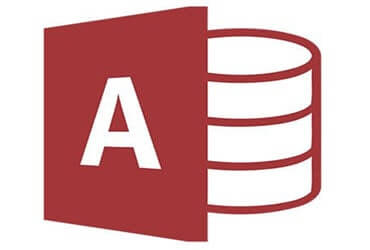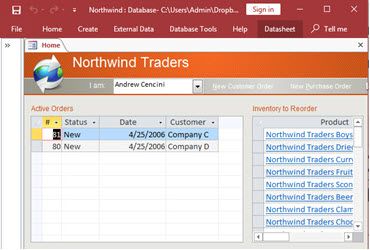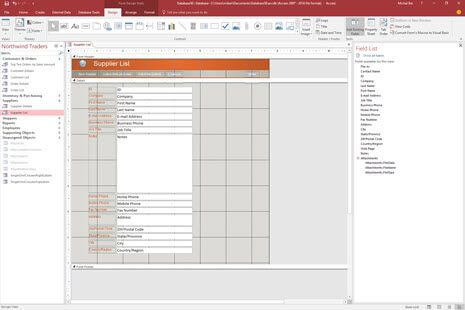
MS Access As A Dev Tool
Access continues to be a highly efficient tool for business database development.
The Best Microsoft Access Database Solutions owner, consultant, and principal programmer is Alison Balter - a recognized expert Microsoft Access consultant. Alison is the author of 15 Microsoft Access training books and videos. She is a frequent guest speaker at MS Access conferences and has developed hundreds of applications for businesses of all types.
We know your business data is important; we listen to your concerns, ask questions, and gather information from all stake holders. We discuss your needs and requirements for your database. We find out what you want, why you need various features so we can obtain as much information as possible. Once we have the information we need, we work with you to design the proper database architecture, plus the dashboards, the questions (queries), forms, and reports you need for an excellent database system.

We also create websites designed for speed to display your data accurately, using ASP.NET technology. Fast, secure, and robust, our ASP.NET web sites and web applications give you true business tool for finding and displaying information dynamically on the web.








Access continues to be a highly efficient tool for business database development.

How to create a Microsoft Access application with some unique tips and tricks.

Your Access developer near me has some great info for you about using Access efficiently.
Call MS Access Solutions at (323) 285-0939 for your FREE consultation.
The following material from Alsion Balter discusses the problem of Access "bloat". MS Access Solutions has a lot of experence in this area, so if you need help with your Access database, contact us.
At MS Access Solutions, we've seen countless databases suffering from unexplained growth in file size. This phenomenon, known as database bloat, can transform a sleek 10MB application into an unwieldy 1GB behemoth without adding any meaningful data. Beyond the obvious storage concerns, bloated databases run slower, crash more frequently, and eventually approach Access's 2GB size limit. Let me walk you through proven strategies to keep your databases trim and performing at their best.
One of the most significant yet least understood causes of database bloat involves Access's record locking mechanism. Unlike true row-level locking found in enterprise database systems, Access implements page-level locking. When you enable record-level locking, Access expands records to fill entire database pages, dramatically increasing file size.
The fix is straightforward: navigate to Options → Client Settings and uncheck "Open databases by using record-level locking." This single setting change often yields remarkable results. I recently worked with a client whose database shrank from 1.6GB to 300MB after implementing this change alone.
Many Access developers rely heavily on temporary tables for data manipulation. While convenient, this approach leaves database fragments that accumulate over time. Instead, consider using recordsets in memory for temporary data operations. When temporary tables truly can't be avoided, create them in a separate temporary database linked to your main application rather than within your primary database file.
This approach isolates the bloating effect to a disposable file that can be regularly recreated without affecting your main application. The performance gains from this technique can be substantial, particularly in multi-user environments.
Dynamically creating and deleting database objects (tables, forms, reports) through VBA code is another major contributor to bloat. Each creation/deletion cycle leaves fragments in your database file. I've encountered databases where previous developers generated "throwaway" reports on demand, causing the database to grow by several megabytes daily.
Instead, create permanent objects with visibility conditions or parameter queries that filter data as needed. This approach delivers the same functionality without the bloating side effects.
Improper VBA coding techniques can silently inflate your database size. Always explicitly close recordsets when finished with them using the Close method. Similarly, avoid non-QueryDef SQL (dynamic SQL strings) whenever possible. Access must "bind" these statements every time they run, consuming workspace that isn't recovered until compaction.
Use saved QueryDefs instead, as Access preserves their execution plans, improving both performance and file size management. This small coding change often yields outsized benefits.
Unoptimized images represent another common bloating culprit. Always resize images to their final display dimensions before importing them into your database. I once reduced a database from 1.8GB to just 85MB by optimizing only three logo images used throughout the application.
Similarly, avoid using the Attachment data type introduced in Access 2007. Instead, store files on a central server and maintain only the file paths in your database. This approach improves performance while dramatically reducing file size.
Even with perfect prevention techniques, regular maintenance remains essential. Schedule automatic compact and repair operations during off-hours. Consider implementing VBA code that checks database settings contributing to bloat, such as Track Name AutoCorrect (which should be disabled).
For multi-user environments, ensure each user has their own front-end copy rather than sharing a single file. This practice not only prevents bloating but also improves overall system stability and performance.
When implementing these changes in existing applications, start with the record-level locking setting and regular compaction, as these provide immediate benefits without code changes. Then progressively implement the coding and architectural improvements during your normal maintenance cycles.
By applying these techniques consistently, you'll maintain lean, efficient databases that deliver reliable performance without approaching Access's size limitations. Your users will notice the difference, even if they can't articulate exactly why the system suddenly feels more responsive.
When your Gardena, California business needs professional Microsoft Access database expertise, contact MS Access Solutions at (323) 285-0939. We turn your frustrating data headaches into smooth-running business applications with Microsoft Access databases built to your requiremets.
We approach each project with both technical precision and practical business insight, creating database systems that not only function flawlessly but genuinely enhance your operational capabilities. Our clients appreciate how we translate their unique workflows into intuitive database interfaces that boost productivity from day one.
For 25+ years, we've developed specialized knowledge across numerous sectors, allowing us to quickly understand the unique data requirements of virtually any organization:
From ground-up development to targeted improvements, we handle Access projects of every scope and complexity:
What truly sets us apart isn't just technical skill but our commitment to understanding your business objectives. We view database development as a partnership where your operational knowledge combines with our technical expertise to create systems that deliver measurable value. Every solution we implement focuses on long-term reliability while providing the flexibility to adapt as your organization evolves.
Find out more about MS Access Solutions programmer services on the Microsoft Access programmer Glendale, California web page.